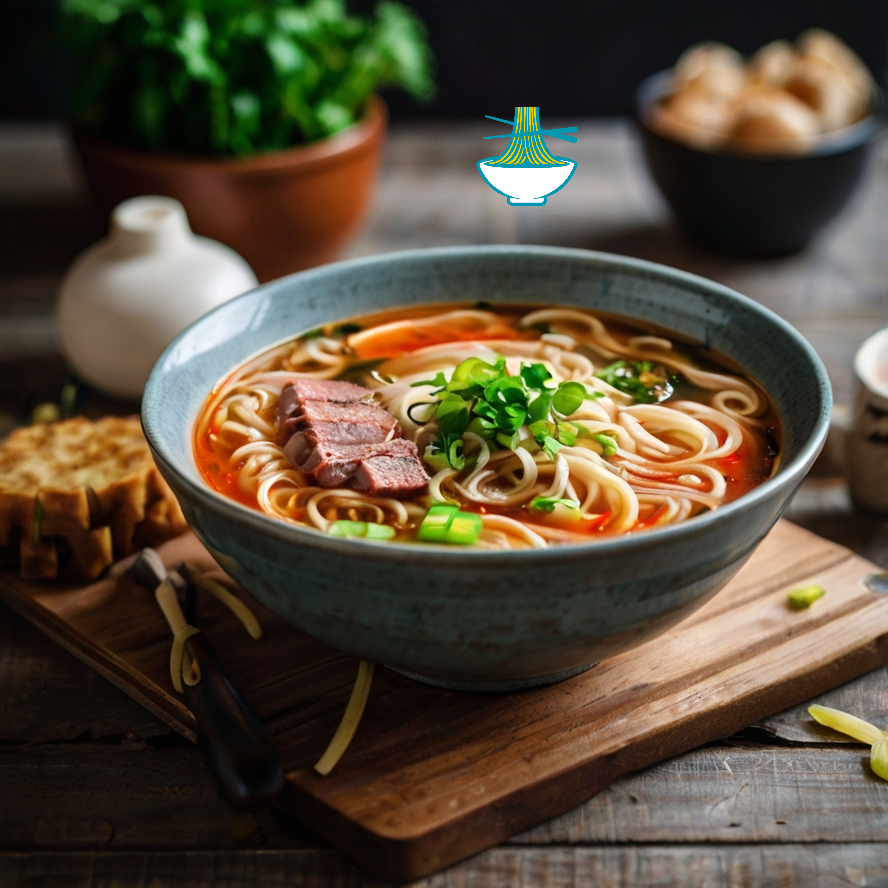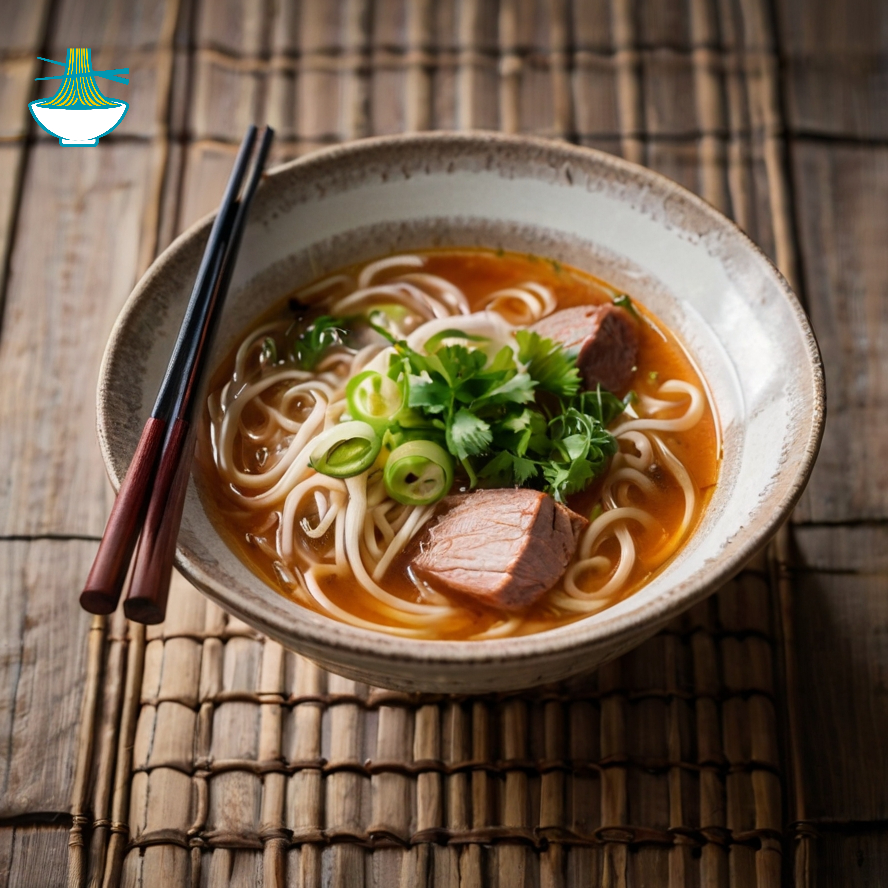Guriltai Noodle Soup is a traditional Mongolian dish featuring tender meat, vegetables, and noodles in a flavorful broth. This hearty soup offers a balanced blend of ingredients, making it a comforting and satisfying meal.
Guriltai Noodle Soup has deep roots in Mongolian culinary traditions, dating back centuries. Originally crafted by nomadic tribes, it was a nourishing staple enjoyed during long journeys across the vast Mongolian steppes. Over time, variations of the recipe emerged, with each family adding their own unique touch. Today, Guriltai Noodle Soup remains a beloved dish in Mongolia, cherished for its rich flavors and cultural significance.
Ingredients:
- 250g beef or lamb, thinly sliced
- 1 onion, chopped
- 2 carrots, sliced
- 2 potatoes, diced
- 2 garlic cloves, minced
- 1 tsp vegetable oil
- 6 cups beef or vegetable broth
- 200g noodles (such as egg noodles or rice noodles)
- Salt and pepper to taste
- Fresh parsley or cilantro for garnish (optional)
Method:
1. Heat vegetable oil in a large pot over medium heat. Add chopped onions and minced garlic, sauté until fragrant.
2. Add sliced beef or lamb to the pot, season with salt and pepper. Cook until browned.
3. Pour in the beef or vegetable broth and bring to a simmer.
4. Add sliced carrots and diced potatoes to the pot. Cook until vegetables are tender, about 10-15 minutes.
5. Meanwhile, cook noodles according to package instructions until al dente. Drain and set aside.
6. Once vegetables are tender, add cooked noodles to the pot. Adjust seasoning with salt and pepper if needed.
7. Serve hot, garnished with fresh parsley or cilantro if desired. Enjoy your delicious Guriltai Noodle Soup!
Nutrition Value:
1. 250g beef or lamb, thinly sliced:
- Calories: Approximately 370-450 calories (depending on the cut of meat)
- Carbohydrates: 0g
- Protein: Approximately 30-40g
- Fat: Approximately 25-35g
- Sodium: Varies
- Cholesterol: Approximately 100-150mg
- Vitamins: B vitamins (especially B12 and niacin)
- Minerals: Iron, zinc, phosphorus
- Nutritional benefit: Excellent source of high-quality protein, iron, and other essential nutrients.
2. 1 onion, chopped:
- Calories: Approximately 40 calories
- Carbohydrates: Approximately 10g
- Protein: Approximately 1g
- Fat: 0g
- Sodium: Varies
- Cholesterol: 0mg
- Vitamins: Vitamin C, vitamin B6
- Minerals: Potassium, manganese
- Nutritional benefit: Rich in antioxidants, particularly quercetin, and may have anti-inflammatory properties.
3. 2 carrots, sliced:
- Calories: Approximately 50 calories
- Carbohydrates: Approximately 12g
- Protein: Approximately 1g
- Fat: 0g
- Sodium: Varies
- Cholesterol: 0mg
- Vitamins: Vitamin A, vitamin C, vitamin K1
- Minerals: Potassium, fiber
- Nutritional benefit: Excellent source of beta-carotene, which converts to vitamin A in the body, promoting good vision and immune function.
4. 2 potatoes, diced:
- Calories: Approximately 150-200 calories
- Carbohydrates: Approximately 30-40g
- Protein: Approximately 3-5g
- Fat: 0g
- Sodium: Varies
- Cholesterol: 0mg
- Vitamins: Vitamin C, vitamin B6
- Minerals: Potassium, manganese
- Nutritional benefit: Good source of complex carbohydrates, potassium, and vitamin C, providing energy and supporting overall health.
5. 2 garlic cloves, minced:
- Calories: Approximately 10 calories
- Carbohydrates: Approximately 2g
- Protein: Approximately 0.5g
- Fat: 0g
- Sodium: Varies
- Cholesterol: 0mg
- Vitamins: Vitamin C, vitamin B6
- Minerals: Manganese, selenium
- Nutritional benefit: Contains allicin, a compound with potential antibacterial and antiviral properties, as well as antioxidants.
6. 1 tsp vegetable oil:
- Calories: Approximately 40-50 calories
- Carbohydrates: 0g
- Protein: 0g
- Fat: Approximately 5g
- Sodium: 0mg
- Cholesterol: 0mg
- Vitamins: Vitamin E
- Minerals: Varies (depending on the type of oil)
- Nutritional benefit: Provides essential fatty acids and fat-soluble vitamins, helping to absorb fat-soluble nutrients from other foods.
7. 6 cups beef or vegetable broth:
- Calories: Approximately 30-50 calories
- Carbohydrates: Approximately 1-2g
- Protein: Approximately 3-5g
- Fat: 0g
- Sodium: Varies (depending on the broth)
- Cholesterol: Varies
- Vitamins: Varies (depending on the ingredients used to make the broth)
- Minerals: Varies (depending on the ingredients used to make the broth)
- Nutritional benefit: Provides hydration and adds flavor to the soup, while also potentially offering additional nutrients depending on the ingredients used.
8. 200g noodles (such as egg noodles or rice noodles):
- Calories: Approximately 200-250 calories
- Carbohydrates: Approximately 40-50g
- Protein: Approximately 5-8g
- Fat: 0-3g
- Sodium: Varies
- Cholesterol: 0-50mg
- Vitamins: B vitamins (especially if made from enriched flour)
- Minerals: Varies
- Nutritional benefit: Source of carbohydrates for energy, and if made from whole grains, can provide fiber and additional nutrients.
9. Salt and pepper to taste:
- Calories: 0g
- Carbohydrates: 0g
- Protein: 0g
- Fat: 0g
- Sodium: Varies (depending on the amount used)
- Cholesterol: 0mg
- Vitamins: 0g
- Minerals: Sodium (from salt)
- Nutritional benefit: Adds flavor to the dish, but should be used in moderation to avoid excessive sodium intake.
10. Fresh parsley or cilantro for garnish (optional):
- Calories: Approximately 5-10 calories
- Carbohydrates: Approximately 1-2g
- Protein: Approximately 0.5-1g
- Fat: 0g
- Sodium: Varies
- Cholesterol: 0mg
- Vitamins: Vitamin K, vitamin C
- Minerals: Varies
- Nutritional benefit: Adds freshness and color to the dish, while also providing small amounts of vitamins and minerals.


Comments